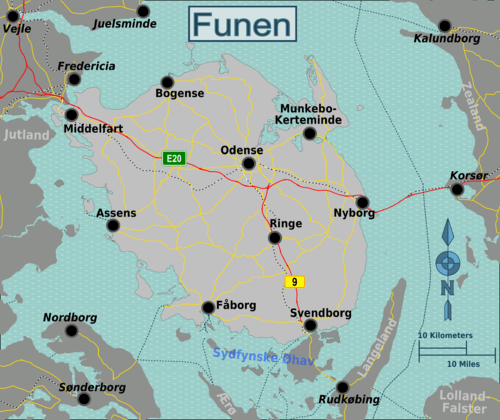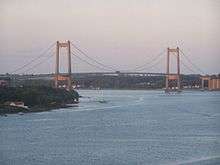Funen
Funen (Danish: Fyn) is Denmark's second largest island, between the Jutland peninsula, and the capital island of Zealand.
The capital of the island is Odense, birthplace of famous author H.C. Andersen. Funen is a picturesque area with sandy beaches and lush vegetation, traditionally known as the agricultural heartland of Denmark. As a term of endearment, Funen is known as Danmarks grønne ø ("Denmark's green island"). Funen is a convenient destination for travellers from mainland Europe, as both a major European highway as well as all transnational trains in Denmark cross the island and its capital.
Cities

- 🌍 Odense Regional Capital of Fyn (Funen) island and Denmark's third largest city.
- 🌍 Assens Coastal town
- 🌍 Bogense
- 🌍 Faaborg Coastal town
- 🌍 Kerteminde Coastal town, located on the north eastern coast of the Great Belt.
- 🌍 Middelfart Coastal town by Lillebælt bridge to Jylland(Jutland)
- 🌍 Nyborg Coastal town by Storebælt bridge to Sjælland )(Zealand)
- 🌍 Otterup
- 🌍 Ringe
- 🌍 Svendborg is a port town with a bridge to 🌍 Tåsinge and 🌍 Langeland and a ferry to 🌍 Ærø
Other destinations
Understand
Funen is very much the island in the middle between Zealand and Jutland. Mockingly it is said that Funen only exists to carry the highway between Copenhagen and Aarhus, while the locals on the other hand claim to harbour the best traits of both Jutland and Copenhagen. Funen is a place for good life and is generally easy going. You can easily find good food at reasonable prices, and good humour is everywhere. Funen however has one unrivalled claim to fame: Odense, the main city on Funen, is the birthplace of world famous writer Hans Christian Andersen.
Talk
Danish is of course spoken by all inhabitants. Swedish and Norwegian are both somewhat understood, but English is more widely spoken amongst all inhabitants, except for very young children and the elderly over 70. German is taught in schools, but generally only spoken to a lesser degree. French is taught in some public schools, but few speakers can be found, those existing will be found mostly in Odense. In Odense, quite a few immigrants with some knowledge of either Arabic, Turkish or Persian can be found.
Get in

By car
Funen is crossed by the major European highway E 20, and is thereby connected to Zealand with the Great Belt bridge (toll bridge) and to Jutland with the Little Belt bridge (free).
By train
The central rail station in Odense is a transit point for all trains from the European mainland towards Copenhagen, therefore it can be reached from anywhere in the country.
By air
The small Odense Airport is located around 17 km from the city center of Odense, but except for holiday routes to Southern Europe, it is only accessed by chartered airplanes. The airport is home to a number of air charter companies, but chartering an airplane is of course comparatively expensive.
Some major international airports nearby are Copenhagen Airport, Billund, and Hamburg.
Get around
By car
A good road and motorway system connects all coastal towns with each other as well as Odense. A recently opened highway connects the capital Odense with Svendborg. Even rural roads are of high quality, as in the rest of Denmark.
By bike
The island of Funen is very bike friendly, with only the center of the island being hilly. Most roads in and from Odense have dedicated bike paths. Beware of no-cycling signs, though.
By train
Direct and non-stop from Copenhagen hourly. On Fyn there is service from Odense Central Station to Ringe and Svendborg, as well as the train line crossing the island, which also transverses the cities of Middelfart and Nyborg. Other towns are served by bus.
By bus
All towns and small communities are served with high daily frequency. In Odense an extensive bus network serves all parts of the city as well as its suburbs.
By cab
Taxis are aplenty in towns at fixed rates, including a service charge. There are cab stands in some places, as cabs cannot usually be hailed on the street. Phoning a taxi company is advised instead, in Odense the cab will usually arrive in less than fifteen minutes. Pirate cabs are non-existent.
See
The island is home to the famous author H.C. Andersen, whose former residence located in the city center of Odense has been converted to a museum. Just south of Odense, the village of Nørre Lyndelse includes the birthplace of famous composer Carl Nielsen, whose works are known internationally. A museum tells the story of his life and work.
Svendborg and Kerteminde are both picturesque maritime towns with colorful houses and cobblestone streets, though Kerteminde has a somewhat more untouched quality, and is home to Fjord- og Bæltcentret, an interactive museum about ocean lifeforms, with ocean mammals as the main focus. Both cities were traditionally fishing towns, and therefore quality fish restaurants are ubiquitous.
Odense is home to Den Fynske Landsby, a recreation of the rural past of the island, including only original houses moved from all parts of the island and carefully reconstructed. Somewhat similar to a permanent renaissance fair, although the time period is the 18th and 19th centuries. Activities are spread across the year, and include milking, traditional harvests and manufacture of old-fashioned handicrafts and foods, where the visitors can participate.
In general, all of Funen has potential beautiful natural experiences, and many, if not almost all forests are open to the public and have hiking and biking paths from which the scenic surroundings can be experienced. In the northern part of the island, a forest (Langesøskoven) also includes a picturesque lake and lush wildlife.
Do
Odense has a comparatively large shopping street as well as a few well-assorted malls, the largest of which, Rosengårdcentret, is located in the southeastern suburbs. The city has a vibrant nightlife, and music can be experienced both at outdoor events and in clubs, especially Magasinet and Jazzhus Dexter, respectively venues for alternative rock and jazz. Shops fabricating traditional handicrafts as well as modern applied arts items can be found in many of the island's cities. Beware of the difference between tourist shops and genuine artisans.
Fishing in streams, rivers, lakes and the ocean is a popular activity for locals and tourists alike, and Odense River has a large and well-supported population of rainbow trout. All fishing requires a permit, obtainable at post offices and most fishing equipment shops. If in doubt, contact tourist offices, which can refer you to the nearest permit vendor. Hunting is also possible, but requires proof of hunting capability and a permit from the governmental wildlife agency.
Eat
Odense has many restaurants, ranging from fast food places like McDonald's and Burger King, to traditional Danish restaurants like Carlslund or Boulevardkroen, and haute cuisine restaurants, especially worthy of mention is Restaurant Kvægtorvet. International cuisine is also prevalent, Italian, Greek, Chinese, American, Indian, Arabic and Vietnamese restaurants can be found. The former four types are mainly found in the city center, whilst the latter three cuisines are represented at Bazar Fyn, located in the eastern suburbs of Odense, home to a number of ethnic minorities. There, the food is comparatively cheap and generally of good quality. In general, food is expensive in Denmark, both in supermarkets and restaurants, but low-budget travellers will appreciate the discount stores ubiquitous in all towns.
For traditional Funish fare, which is mainly fish and seafood dishes, a trip to Kerteminde, Svendborg or Bogense is highly recommended. In Kerteminde, a somewhat expensive but worthwhile seafood restaurant, Rudolf Mathis, is located, serving high-quality fish fare. In the other cities, looking for the words "fisk" or "skaldyr" is possible, as these indicate the presence of fish and seafood on the menu. If in doubt, you could always ask a local, they will probably be able to point out a local secret with lovely, hearty dishes of local cuisine.
- Æggekage
- Jødetorsk
- Fynsk Rygeost
🌍 Fjelsted Skov Kro, Store Landevej 92 (off motorway E20, get off af exit 56 Ejby from west, exit 55 Aarup from east), ☎ +45 64881660, e-mail: fjelstedskovkro@fjelstedskovkro.dk. If you are crossing Funen by car on the motorway and want to eat a nice place without wasting too much time this is the place to go. Great food at reasonable prices close to the motorway Daily specieal DKK 105, weekend DKK 120.
Drink
Beer is the cornerstone of Danish beverages, and the local brewery Albani, located in Odense, produces lovely lagers and darker varieties. For even better microbrewery beer, look for the brands "Vestfyen" (brewed in Assens), "Refsvindinge" (brewed in the town of that name) and "Midtfyns Bryghus" (brewed in Brobyværk) on menus and supermarket shelves. The bar Christian Firtal in Odense serves these and other local products as well as English cask and bottled ales, Belgian and German beer.
High quality spirits are also available, and aquavit is traditionally a part of Danish lunches in general. Only few brands are locally produced, though, and these are not widely available. Most are imported from the rest of Denmark.
Stay safe
In general Funen and Odense are very safe, and no violent crimes are commonly committed against tourists or locals. In general, although Denmark is comparatively lax on drugs, do not attempt to purchase any drugs, as this will often involve interaction with biker gangs or immigrant gangs, which in recent years have engaged in a covert vendetta against each other, although these fights have rarely been public, and have never victimized innocent bystanders. Police is visible in all cities, and Odense, Middelfart and Svendborg have hospitals, of which Odense and Svendborg hospitals have acute wards. Police, fire services and ambulances can be contacted by phoning 112, and non-acute calls to the police should be placed on 114. English is spoken by emergency central operators.
Go next
- Sydfynske Øhav is the archipelago south of Funen.
- Tåsinge: An island just across the strait
- Langeland: An oblong island to the east of Southern Funen, can be reached by bridge from Svendborg (Tåsinge), has connections to Spodsbjerg on Lolland.
- Ærø: A beautiful island in the Southern Funen Archipelago. Can be reached by ferry from Svendborg. Main towns are Marstal and Ærøskøbing